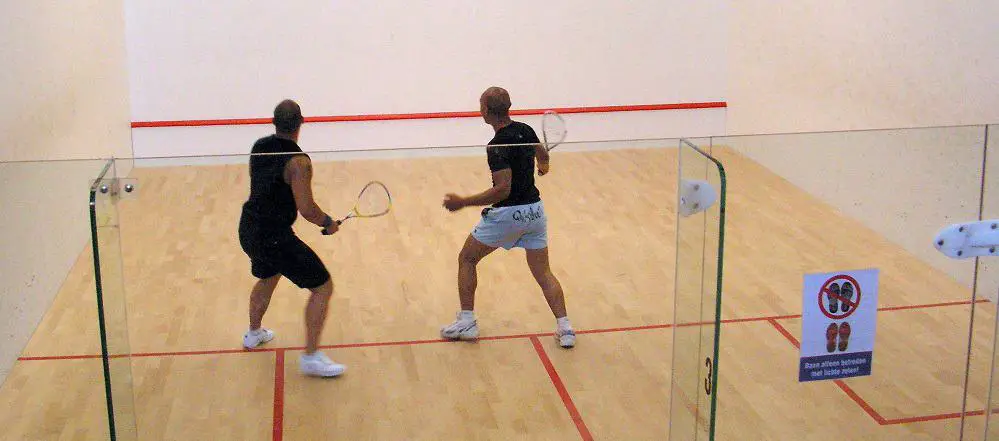While squash is finally expected to make a much-belated appearance in the Olympics at the 2028 Los Angeles games, that wasn’t always the case. There was a huge uproar during the 2020 Olympics in Tokyo when squash did not make it to it as one of the disciplines. The question everyone was asking – or at least racket sports fans were – was why is squash not a part of the Olympics. In this piece we look to answer that.
‘Citius, Altius, Fortius’ – the motto of the Olympic Games symbolizes the triumph of human spirit and perseverance over adversities.
These three Greek words which are synonymous with the Olympic movement mean Faster, Higher and Stronger.
Any sport aspiring to be a part of this movement should be able to identify with the motto of the games.
The Olympics are all about tenacity, ability and performance under pressure. It is not only about competing with other athletes, but also with oneself.
Anyone who has played squash can testify that very few sports relate to these values any better than squash. Thus, bringing into question, why is this gladiatorial sport not a part of the Olympic Games?
The International Olympic Committee (IOC) carries out a periodic review of sports which may need to be removed from or included as a medal event for subsequent Olympic games.
Reasons for removal can vary from drug abuse to corruption to massive drop in popularity and viewership.
Whenever, a slot becomes available as a result of the deletion of a sport from the list of events, newer sports can get added for subsequent games.
Table of Content
How Does a Sport Get Included into the Olympics?
For a sport to be eligible for getting considered for Olympic games, it must be widely practiced by men in at least 75 countries and on four continents and by women in no fewer than 40 countries and on three continents.
It should not only reflect the traditions of the Olympic Games but also add to its “value and appeal”.
Some of the other rules include exclusion of purely ‘‘mind sports’’ and sports dependent on mechanical propulsion. That makes chess and automobile racing sports ineligible for inclusion. Sorry!
Also Read:
Squash’s Failed Bids for Tokyo 2020 and Before
To keep the Olympic Games relevant for sports fans all over the globe and across all generations, the IOC carried out an assessment of the 26 sports that were contested at the London Olympics.
In February 2013, wrestling was dropped from the list of events for the 2020 Tokyo Games while golf and rugby sevens were the new entrants.
Since, Tokyo 2020 had allowance for 28 sports to be considered, there existed a vacancy for one more sport to be considered.
The Tokyo 2020 committee listed appeal to the youth, added value, attractiveness for media and public, gender equality, less complexity, infrastructure and operational costs as some of the criteria for inclusion of a sport.
Out of the eight sports, including squash, which were being considered for the final spot, Wrestling was re-instated as it secured twice the number of votes than baseball/ softball and squash.
The fact that wrestling traced its history to the ancient Olympic Games as was in the original program for the modern Games was critical in swaying the voters.
Two previous attempts by squash to get considered had also met a similar fate. The unsuccessful bid for London 2012 came as a huge setback considering that squash is primarily considered as a British sport.
Back then, it was unable to gain the two-third majority required to qualify. As a part of it’s Rio Olympic bid, World Squash Federation (WSF) had come out with this beautiful video as well.
The WSF made a deliberate effort to emphasize of the world wide appeal of the sport, the fact that it was not an elite sport anymore, that unlike it is for other sports like tennis and football, the Olympics will be the pinnacle event for squash.
However, the very limited presence of the sport in South America was one of the primary reasons for not getting considered for Rio 2016.
Squash’s Inclusion Attempt for Paris 2024
Banking on the presence of two champion squash players of French origin – Camille Serme and Gregory Gaultier, the WSF expected to find some takers for its inclusion in Paris 2024.
The presentation highlighted on how the glass courts could be placed at iconic locations to make an immersive viewing experience as well as showcase the host city.
The fact that the courts could be built within 25 hours and dismantled in even lesser time and the venue could host 5,000 spectators in an area of less than 6,000 square meters were added advantages. The sport is gender neutral, has a much improved media and TV coverage were further aspects that were stressed upon.
However, the disappointing saga of squash’s rejections continued with its failed attempt for inclusion in Paris 2024.
Apparently squash did not meet the bill to “make the Olympics more urban” and thus the sports of break dancing, sport climbing, skateboarding and surfing were proposed as additional sports for the event.
The incredulity and disappointment around this news has even led to legendary players like Nick Matthews to suggest that squash should consider taking legal actions against the IOC.
The multiple British open winner is quoted to have said:
“We should have been part of the Olympic movement years ago, certainly from London 2012. It’s very frustrating and I don’t see anything that will change if we carry on doing the same things. Sports are being pulled from left field now.”
He further stated the sports like skateboarding which were included in the Olympics were without a national governing body at the time of their selection. Matthews exhorted the IOC to be made accountable.
Also Read:
Way Ahead for Squash
Having being repeatedly rejected as an Olympic sport, securing adequate funds from national sporting bodies remains a big challenge for squash federations worldwide (incidentally this is where the world pickleball organizations could take cue too if they want pickleball to soon be included in the Olympics).
Selection for the Olympics would have been a major shot in the arm not just financially, but would also have increased the viewership and pushed more people into taking to the sport.
Even though squash has taken definitive steps towards innovation, youth engagement, ensuring environment sustainability and equality, it still has a few factors that repeatedly keep balking its efforts for greater honors.
The sport still continues to be viewed with a ‘Members Only’ prism.
Whether Brake Dancing qualifies as a ‘sport’ is a matter for another discussion, however, the very nature of Brake Dancing makes it available to people of all ages and all walks of life, with requirement for negligible infrastructure.
Nothing speaks ‘Elite’ more than Golf.
The sport however still seems to get its way because of the high profile of the sport, the fact that it’s top players are known world over, and of course the obscenely huge prize money involved. Squash on the other hand only recently had it first ever event which had a million dollars as the prize money.
The launch of the Squash TV a few years back was a step in the right direction, however, further efforts need to be made to improve the visibility of the sport among the masses.
There still exists a huge number of people world over who consider squash to be a sub-set of tennis, so much so we get questions on whether squash can be played with a tennis racket. Some think squash and racquetball are the same sport.
Over the years, the sport has been primarily played in certain pockets of the world like Pakistan, Great Britain, France, Australia.
Over the past few decades, Egypt has taken the sport by storm and dominates tournaments world wide. There is a need to find top class players from more countries, which can only happen through grass root development of the sport in newer nations.
Way Forward for Squash at the 2028 Olympics
As in February 2022, the International Olympic Committee or the IOC as it’s called has approved surfing, skateboarding and sport climbing for the 2028 games as well.
According to IOC President Thomas Bach, the reason to include these sports is because of their success at the Tokyo games, the fact they have a youth-based following and has a strong following in Los Angeles and in California where the games will be held in 2028.
The good news for squash – and some of the other sports like cricket – is that it’s finally been introduced at the Olympics. We certainly hope it remains a part of the Olympics in the years to come as well.
Final Words on Squash in Olympics
Squash has often been ranked as one of the healthiest sports in the world.
The fact that its successive Olympic bids kept getting ignored was nothing short of tragic.
It denied a whole new audience from getting introduced to the beautiful sport. The WSF and national sporting bodies including US Squash have done a good job though to seek qualification for Los Angeles 2028 and we look forward to how it goes from here on.


